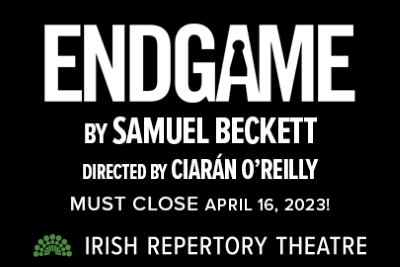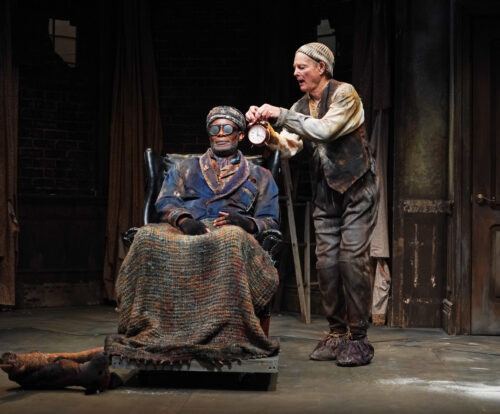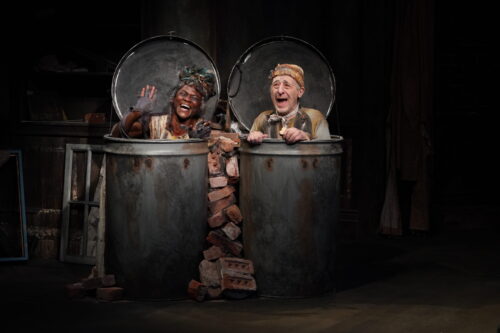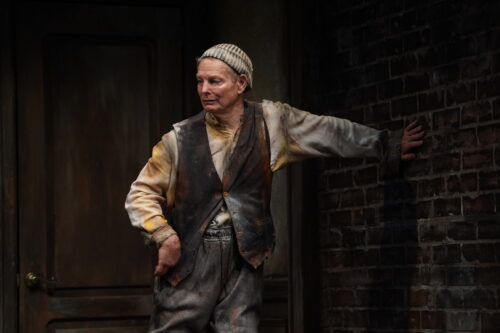IT WOULD BE ABSURD TO MISS THIS THEATER
In Endgame, the end of the world is upon us. But so, too, is the end of Ciarán O’Reilly’s superlative production at Irish Rep, which has been extended to — and must close — April 16, 2023. Four characters inhabit a squalid little room where the blind and disabled master Hamm (a resonant John Douglas Thompson) barks orders from a throne to his servant Clov (master of physicality Bill Irwin), who may also be Hamm’s son. (Some critics say yes, some say no. I say that it doesn’t matter, just be in the question.) Hamm cannot stand up and Clov cannot sit. Their relationship is somewhat like that of George and Martha in Who’s Afraid of Virginia Woolf? – you can tell that they have been arguing for years, but that dynamic seems to be the raison d’etre of their relationship – they feed on game-playing and one-upping each other as to “who” needs “whom” more:
HAMM: Why do you stay with me?
CLOV: Why do you keep me?
HAMM: There’s no one else.
CLOV: There’s nowhere else.
And later in the play:
CLOV: So, you all want me to leave you.
HAMM: Naturally.
CLOV: Then I’ll leave you.
HAMM: You can’t leave us.
CLOV: Then I won’t leave you.
Clov constantly threatens to leave, but in the end, he stands with possessions in hand, watching the man who dominates him. Besides, where would he go? The outside world is desolation and Clov’s red face hints at the chemical destruction in the world.
Disconnection? Radiation? Master/Slave relationships? Disillusionment? Preoccupation with death? One would think that Endgame was written yesterday, so topical are its themes. Beckett must have been joking when he denied that his play takes place in a post-nuclear world, where even death itself carries no meaning. In fact, Hamm shows no surprise when his mother Nell (Patrice Johnson Chevannes) emerges from an ashbin to reminisce with her husband Nagg (Joe Grifasi), only to slink back into her ashbin and die.
You may have no idea what’s happening. There is no plot, the dialogue is seemingly gobbledygook, and characters are filled with despair, yet you are told that this is Theatre of the Absurd, one of the milestones in modern drama. Still more maddening is that others around you can’t believe you don’t “get it” — and assure you it is a comedy (and it is) — yet very few of them can explain just what “absurdism” is.
Part of the delicious attraction to Theatre of the Absurd – and the philosophy of existentialism that gave birth to this style of theatre – is that it frees us from having to explain anything. This freedom – this acknowledgement that life is a riddle that is inside a mystery, which is inside an enigma, which is inside a question – actually incites passion to live life to the fullest. After all, mankind is festooned with belief systems that didn’t bring peace to the generations we inherited them from – why should we adhere to them?
There may be a disparity of reactions from audience members to the play itself: Most will salivate at each hidden reference in Endgame, sitting on the edge of their seats as characters humorously grapple with the meaninglessness of existence. A few will slump down in a nonplussed state of ennui, staring at their watches for the umpteenth time long after they’ve asked themselves just what in the depressing hell is going on ’¦ but you simply must witness these 90 minutes. After all, you are dealing with a playwright who said, “Nothing is more real than Nothing.” A pinnacle of Beckett’s characteristic raw minimalism, Endgame is a pure and devastating distillation of the human essence in the face of approaching death. “Nothing is funnier than unhappiness” invokes Nell, which summarizes the tragicomic nature of this timeless play.
photos by Carol Rosegg
ENDGAME
Irish Repertory Theatre, 132 West 22nd Street
Francis J. Greenburger Mainstage
ends on March 12, 2023 EXTENDED to April 16, 2023
for tickets, call 212-727-2737 or visit Irish Rep




